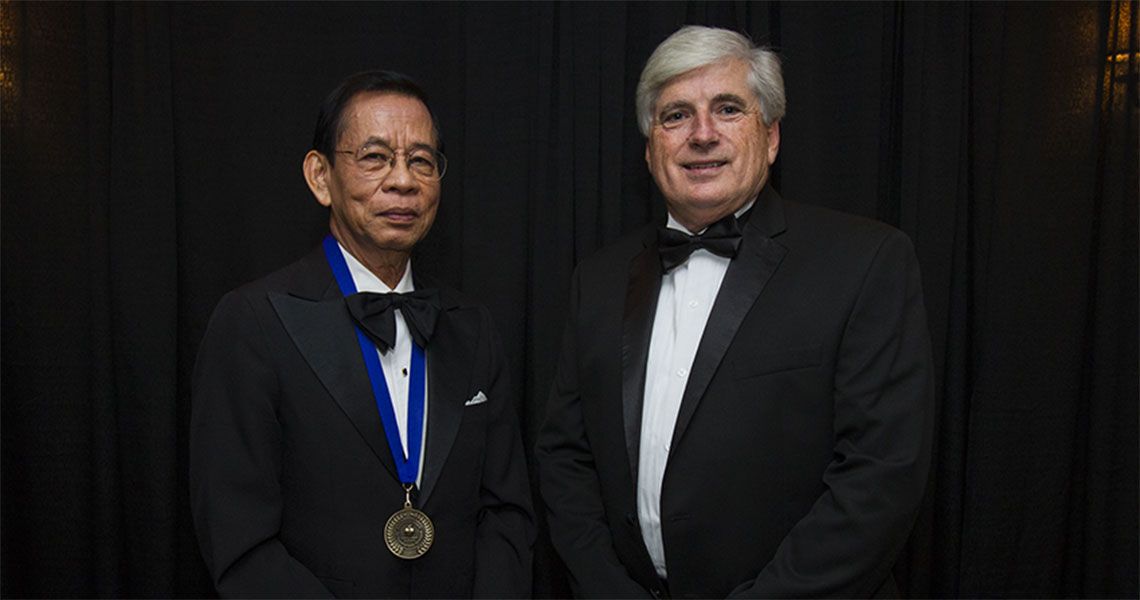Congratulations to Pedro A. Jose, M.D., Ph.D., professor of medicine in the Division of Renal Diseases and Hypertension and professor of pharmacology and physiology at the George Washington University (GW) School of Medicine and Health Sciences, who was a co-recipient of the prestigious American Heart Associations’ 2015 Excellence Award in Hypertension Research.
This award honors excellence in research and discoveries in the field of hypertension, as well as a researcher's contributions. Recipients are selected for the impact on their fields throughout their productive careers, as well as any single discovery. Dr. Jose joins an elite group of recipients of this award, many of whom have gone on to win the Nobel Prize in physiology or medicine.
Dr. Jose received this award for his landmark research delving into the relationship between a high sodium diet and an increase in blood pressure.
“Most people will say that when you eat a lot of salt, the kidney responds to this by increasing the excretion salt, but that does not always happen,” said Dr. Jose. “If you eat salt now, in few hours you will excrete the salt, and your blood pressure may or may not increase. How does the kidney know you have to excrete the salt you have just eaten? This is what we described in our research.”
Dr. Jose found that an increase in sodium excretion after a meal is actually due to signaling from the stomach, which increases gastrin secretion, and, in turn, increases dopamine production by the kidney. It is gastrin acting on renal gastrin or CCKB receptors and dopamine acting on renal dopamine receptors that then inhibit sodium transport in the kidney, resulting in the excretion of sodium, independent of any increase in blood pressure.
Dr. Jose joined the GW School of Medicine and Health Sciences from the University of Maryland in the fall of 2015 and brings an impressive expertise in personalized medicine for hypertension care.
“Dr. Jose not only has an impressive research portfolio, but is also working with the physicians at GW to provide the very best care to our patients; rather than prescribing ‘trial and error’ drugs to our hypertension patients, his research will enable treatment of patients based on their genetic makeup,” said Alan Wasserman, M.D., president of the GW Medical Faculty Associates and chair of the Department of Medicine and Eugene Meyer Professor of Medicine at the GW School of Medicine and Health Sciences.
“Due to certain genetic markers, Dr. Jose is able to determine whether a patient will have a poor response to certain drugs and plan accordingly,” said Dominic Raj, M.D., director of the Division of Renal Diseases and Hypertension at the GW School of Medicine and Health Sciences. “We are thrilled to have Dr. Jose here at GW.”
Dr. Jose is also researching the genes at play in those who have salt-sensitive hypertension. About 50 percent of patients with high blood pressure are salt-sensitive, while 25 percent of patients with normal blood pressure are also salt-sensitive. Those with salt-sensitivity, regardless of their blood pressure level, have the same chance of dying of cardiovascular disease. Because salt-sensitivity cannot be readily diagnosed in patients with normal blood pressure, Dr. Jose is working to find a way to easily test and identify those who are salt-sensitive. He hopes this test will also help the 15 percent of hypertension patients whose blood pressure actually increases when placed on a low salt diet. This research is an important step toward “personalized medicine” in the care of patients with elevated blood pressure.
Dr. Jose received the award at the American Heart Association’s Council on Hypertension Scientific Sessions 2015, Sept. 16-19 in Washington, D.C.
For more information, please visit at the American Heart Association Blood Pressure Resource Center or the Professional Heart Daily.



